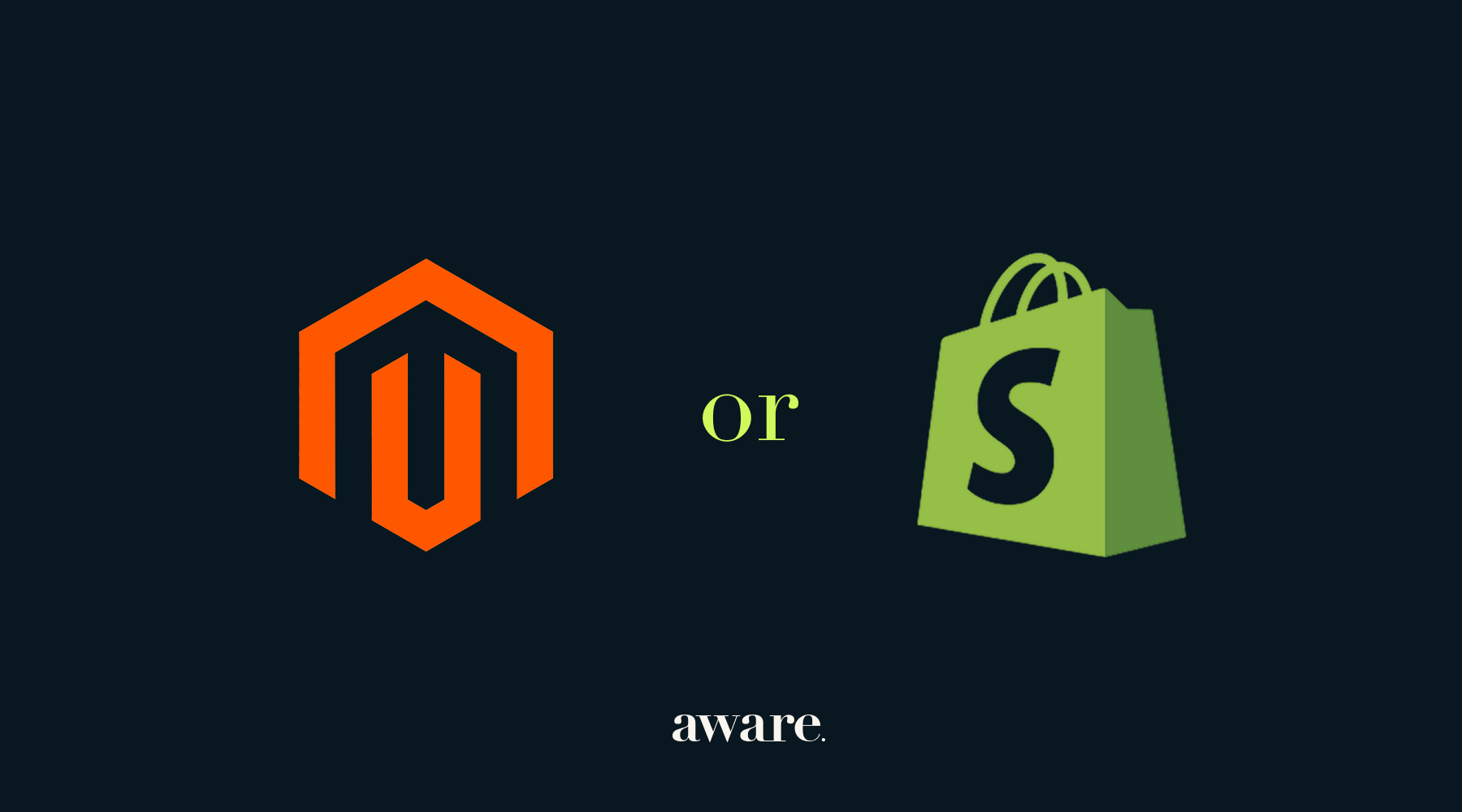
The Shopify vs. Magento debate is everywhere right now - it’s impossible to ignore. From blogs to LinkedIn posts, everyone seems to have an opinion, but the truth is, these platforms offer very different experiences. At Aware Digital, we’ve had the opportunity to work with both platforms. In this post, we’ll break down the key differences between Magento and Shopify, mixed with some insight from our devs and marketers, so we can help you decide which platform best fits your business.
The discussion:
Shopify’s supporters are quick to call out Magento’s complexity, claiming it’s outdated, slow, and overly technical. On the other hand, Magento enthusiasts are firing back, arguing that Shopify lacks the depth and customisation that real eCommerce businesses need.
Recently, Shopify has made a push to position itself as the platform for the “future” of eCommerce, while Magento continues to lean into its open-source heritage and enterprise-grade power. The result? A full-blown showdown, with both sides pushing their version of the truth, and a lot of noise in between.
The facts of the matter:
Magento: The powerhouse of customisation
Magento is based on an open-source platform, which means it offers unparalleled customisation from the get-go. If you need a highly bespoke solution or have complex business requirements, Magento gives you the flexibility to create exactly what you want. With a robust set of features for inventory management, multi-store capabilities, and a huge selection of third-party integrations, Magento is a go-to choice for large, high-volume eCommerce stores.
Shopify: The simplicity of SaaS
Shopify, on the other hand, is a Software as a Service (SaaS) that makes it easy to set up and manage without modifying code or even accessing the code itself. It’s ideal for small businesses that run a limited number of SKUs and want a solution quickly. With a large array of themes and apps, Shopify allows you to get a basic store up and running, most of the time without needing a dedicated development team. But the simplicity of Shopify can also mean limitations in customisation and a mounting monthly cost - death by a 1000 cuts.
Key Differences:
Customisation vs. ease of use:
Magento’s customisation capabilities are unrivalled, and using a specialised company like Aware for your eCommerce development, you can take control over your store’s design and functionality, easily, quickly, and where possible via the admin. Magento is the way to go. However, if you’re looking for an out-of-the-box basic solution and run a very small number of products, it's easy to use Shopify.
Scalability:
Which platform grows with you? Both Magento and Shopify are scalable, but in different ways. Magento is more suited for businesses with complex requirements and larger inventories, and people will tend to focus on B2B, while Shopify shines in scalability for businesses that need simplicity with the ability to grow. Magento’s flexibility allows for highly customised growth, but it requires a more managed approach. Shopify’s scalability is more focused on API’s, especially with its enterprise solution, Shopify Plus.
Costs:
Total cost of ownership: While both platforms have their costs, Magento’s open-source nature means you can choose to invest in bespoke development, but you will need hosting and ongoing security support. For businesses with the resources to support this, it’s a very powerful choice. Shopify, on the other hand, with its subscription-based model, offers a solution with a set cost, but add on those additional apps and transaction fees you’ll find that prices can add up quickly.
We asked our team for one word to describe the differences that define Magento over Shopify:
Andy, Director: Flexibility.
Umar, Lead Front-end Developer: Simplicity.
Ben, Front-end Developer: Flexibility.
Mel, Head Project Manager: Scalability.
Charlie, Project Manager: Customisation.
Business challenges & solutions:
Managing complexity vs. streamlining operations:
Magento has a high volume of features out of the box, but can be extended to work for bespoke businesses. It’s ideal for businesses with both simple and complex needs, whether that’s multi-store setups, unique customer journeys, or tightly tailored workflows. With that power comes a more involved setup, and if your business wants to expand and push boundaries, a need for ongoing technical input might sometimes be required, but the trade-off is deep flexibility and control. Shopify, by contrast, is very default from the start, and the journey from setup to operations is as basic as it comes. For businesses that prioritise ease and speed over customisation, that streamlined experience can be a big win.
Choosing the right fit for your business:
If your eCommerce operation demands a high level of customisation, scalability, and control, Magento offers the flexibility and robustness to meet those needs. It’s a strong fit for businesses with simple and complex requirements or long-term growth plans. If you’re after a quicker launch, Shopify provides an efficient and user-friendly solution that’s especially well-suited to fast-moving teams and growing brands. We asked our team which they'd recommend to a growing business:
Andy, Director: Magento, hands down. For B2B, it can be a very powerful tool that can take people's storefronts to the next level, but for B2C, it has built-in features that don't require app after app after app and monthly plugins. It always comes down to the right fit for the business, but Magento and Adobe Commerce are very powerful tools!
Umar, Lead Front-end Developer: Magento, but it's also dependent on the business's scope and deliverables. It's a very flexible platform to work with and highly customisable, plus there's a huge community behind Magento.
Mel, Head Project Manager: If the business is B2B with big plans to tailor a solution for their customers' needs, I would recommend going straight to Magento instead of using Shopify as a stepping stone solution for the first year or 2.
Charlie, Project Manager: Smaller businesses might be more than happy to do everything themselves on Shopify without little or no help from developers, but a larger or more complicated business might need more complex features that Magento can offer and is happy to pay for a developer to do the work
Common misconceptions
We asked our team what they thought was a common misconception about each platform:
Andy, Director: People think Magento has a crazy cost of ownership, but it can easily be very cost-effective, especially with Aware. Using Hyvä Commerce your store can be fast and cost-effective. Shopify is cheap - yes, it is, but it's only when it is bare bones.
Umar, Lead Front-end Developer: Magento is thought to be really complex, when it isn't. Once you know the fundamentals, it's pretty straightforward. People also think Shopify is just used for small, quick startups, but with Shopify Plus plans, it can host larger enterprises.
Ben, Front-end Developer: People always think it'll cost more than it does for either platform.
Mel, Head Project Manager: Shopify is very cheap to run, compared to Magento, but it has a lot of hidden subscriptions/costs that can add up. Magento is expensive to maintain and add new features. If a site is built correctly from the ground up using best practices in coding standards, the platform should remain relatively easy to maintain and build further upon.
Charlie, Project Manager: People think Magento is complicated. Yeah, there’s a lot of stuff in the admin, and a lot of features, but it follows logical patterns and places to get to things, and even with customisation on the stores, those places don’t change. They also think that Shopify is quick and easy to use from the get-go. It needs as much setup, prep and consideration to use as other platforms, and if it’s not done correctly, the site will suffer.
Our 2 cents:
At its core, Shopify can be used for lots of solutions and has its positives and negatives. If you have ambition for growth and want a fully customised site, Magento is the way forward for you. It can be used for eCommerce as well as CMS - take our word for it, we built our site on it. We also attended a talk where it was revealed that Shopify was the 8th most likely platform to be compromised - just sayin'.
Final thoughts:
We'd love to hear your thoughts. For developers, what's your experience with Magento or Shopify? Do you have a preference? And for eCommerce owners, have you made the switch, or are you still considering both platforms?
If you're still undecided on which platform to choose? Reach out to us at Aware Digital for a consultation, and we’ll help you find the perfect fit for your business. Or subscribe to our newsletter for expert insights, platform comparisons, and strategies to elevate your eCommerce game.








